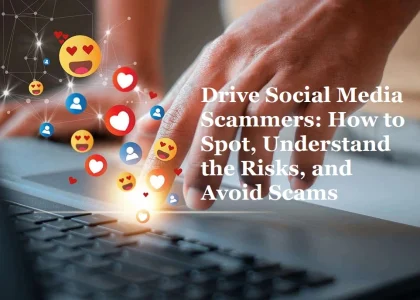Informing Your Bank And Asking For Assistance Is The First Step:
1. Amass As Much Information On The Con As You Can:
How To Recover Money From A Scammer – If the con artist tries to trick you via email, make sure to retain copies of any correspondence they gave you so you can refer to them later.
- If a con artist tries to scam you in person, be sure to alert the police right away. This will help your story about your interactions with the scam artists come off as more credible and real.
- Keep the original letters as well; don’t just rely on printed copies, make sure to do so. The data in email headers is frequently useful to investigators trying to identify con artists.
- If the fraudster tries to contact you through a different channel, such as mail, text messages, or social media, make copies of every message they send you. The originals ought to be kept, just like emails are.
- Keep a notebook where you can record your interactions with con artists and the amounts of money they have requested from you. You can do this by using bank records, credit card statements, or receipts. Give all the information you can, even if you are unsure of the con artists’ identities or whereabouts.
2. Give Your Bank Or Credit Card Company’s Customer Service Line A Call:
How Do I Get My Money Back From A Scammer – When you realize that you are a victim of fraud, get in touch with your bank or Credit Card Company right away. Both full and partial refunds are available for payments.
- Your credit or debit card may have a customer service phone number printed on it. Your bank or credit card issuer frequently needs to be informed within 30 days of the transaction date. In many cases, operators are available 24/7 for these lines. You must select your automated response for each query before clicking “report fraud.”
- There’s a chance that your bank or the company that issued your credit card has a dedicated fraud line. Check out the company website. If you visit a branch during normal business hours, you can complete your financial transaction there.
3. If Your Credit Card Was Stolen, You Should Report It To Your Bank Or The Company That Provided It.
How To Recover Money From A Scammer – Recount the con’s events in chronological order while maintaining your composure. As many specifics as you can, such as the transaction’s date and price should be included. If there were several transactions, you’ll need to be prepared to explain your decision to continue handing the scam artists money.
- The name of the customer service representative you are speaking with as well as any wearable identification numbers you receive should be noted down. Ask for their direct phone number so you may call them if you need to later. Check your records to make sure you’re following the rules for submission.
- Requesting formal confirmation of the occurrence is a good idea. This is something you should keep in mind and note as soon as you receive a letter in response.
4. You Must Give Your Bank Or Credit Card Company Any Further Information They Need:
Your bank or credit card provider needs to look into the fraud. It’s possible that the money will be immediately credited to your account.
The only way to guarantee that you receive your money back is to stay in contact.
- For instance, your bank or credit card provider could ask for the police report. If you could personally bring it to a neighboring branch, that would be wonderful.
- Send copies of all letters you send, as well as the caller ID details, call time, and date of any phone calls you make, to your bank or Credit Card Company.
5. If 30 Days Have Passed And You Have Not Heard From Them, Get In Touch With Them Again.
How To Recover Money From A Scammer – According to US law, the bank or credit card provider has 30 days from the time you first contact them to acknowledge your complaint and launch an investigation.
Among other things, there are similarities between the legal systems in the UK and Canada.
Call the customer service number to find out how your complaint is progressing if a month passes with no changes.
- Consumer protection guidelines only allow 90 days of consultation in such cases, or the earlier of the two, so if the bank or Credit Card Company rejects your appeal, you can speak with a lawyer to learn more about your options.
- In order to find out more about your options in the event that the bank or Credit Card Company rules against you, you can speak with a consumer protection attorney.
6. Officially File A Complaint With A Government Agency If Your Request Is Denied:
The law may require your bank or credit card provider to refund the money if you can demonstrate beyond a reasonable doubt that you were a victim of fraud.
If your bank or credit card provider is unwilling to help, you might be able to obtain your money back with the help of governmental groups that protect consumer rights.
- To submit a complaint to the US Consumer Financial Protection Bureau, go to https://www.consumerfinance.gov/complaint (CFPB). Your bank or Credit Card Company has a certain length of time to respond after receiving your complaint. Within two weeks, the majority of the difficulties are resolved.
- You should see a lawyer to learn more about your options for suing your bank or credit card provider to recover your funds. The majority of consumer attorneys provide a free introductory consultation so that you can consider your choices.
Alternatively, Get In Touch With Police Enforcement.
1. Give The Neighborhood Police Agency A Call:
Call the non-emergency phone number of any police station at any time to report a crime. In order to report financial crimes, such as fraud, to a number of significant organizations, you might need to dial that number.
- In the US, you may get the phone number for your local police department by visiting https://www.usa.gov/local-governments and choosing your region from the drop-down box.
- It is not a good idea to contact 911 to report a scam if you do not believe that your life is in immediate danger.
2. Compile Any Proof That The Scam Is Real:
How To Recover Money From A Scammer – The local authorities will be more likely to look into the case if you can show them evidence of your interactions with the con artists.
You may be entitled to compensation from the criminal court system if your local law enforcement locates the con artists.
- Please be as specific as you can so that the investigators can recognize con artists. If the hoax was carried out online, keep any screenshots or other evidence, as well as authentic digital copies of all emails and other communications involved.
3. Discuss This Situation With The Local Police And Offer To Help:
When speaking with an officer, try to be succinct and direct. Avoid presuming anything about the identity or motives of the con artists if you don’t have any proof to support your assumptions.
- Be sure to keep a record of the name and service number of the officer who granted your request. In addition to that, the police officer will provide you with a report number. You will need a copy of the report, so be sure to get one as soon as it is ready.
4. Pick A Trustworthy Printed Report:
How To Recover Money From A Scammer – When you get written reports, be sure to print copies of them as soon as you can. The officer who took your report will let you know when a written report is ready if one is required.
Since you could pick up the report from the station, you might need to go back.
You may be asked to provide it by your bank, another governmental body, or the business that issues your credit card.
5. Inform Consumer Advocacy Organizations Of The Fraud:
Governmental organizations compile data on con artists and are allowed to send complaints to [email protected] so that they may rapidly prosecute money-recovery claims against them. Several governmental bodies at the federal, state and municipal levels may become involved, depending on the type of fraud.
- In the US, the state attorneys general anti-fraud departments carry out their own investigations and work to file lawsuits against con artists all around the country. The Federal Trade Commission (FTC), for instance, does inquiries and gathers evidence to support complaints made against con artists in the US. If you file a lawsuit against the FTC or reach an agreement with them, you could be qualified to get some of your money back. Put your complaint in using the FTC’s online complaint form.
Consult the website of your state’s attorney general for instructions on how to file a report or complaint.
6. Participate In Any Ongoing Inquiries:
In the event that the con artists are discovered and prosecuted, you may be entitled to criminal restitution to recover some or all of your money. But there’s a chance the authorities’ investigation was superficial.
However, if they are successful in finding the offender, they may ask you to attend a meeting or ask them to call you as a witness in their place.
- Keep any receipts, bank or credit card records, and other payment-related papers since you won’t be able to get your money back unless you can prove that you gave it to the con artists.
“How To Recover Money From A Scammer?” We really hope that the information provided on this page helped you locate the solution you needed. We recommend using these techniques.
Related Article: https://www.demarketo.com/how-do-i-get-my-money-back-from-a-scammer/









